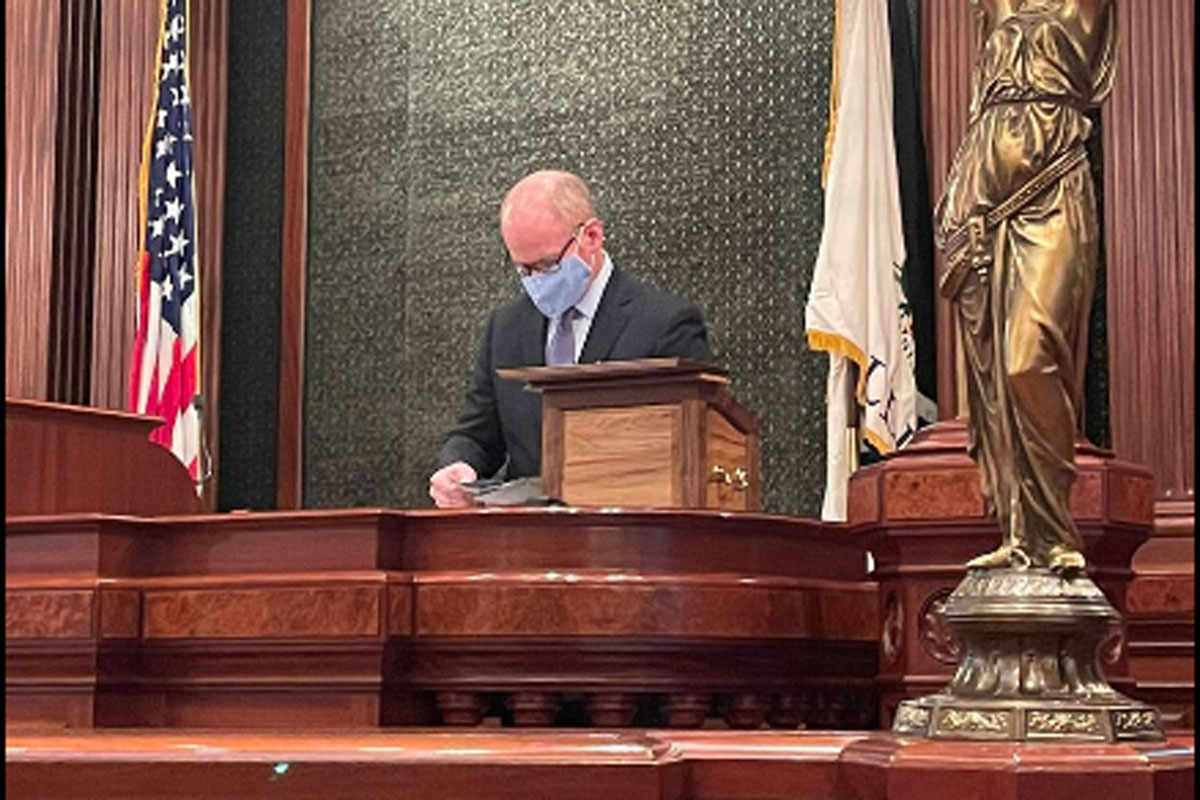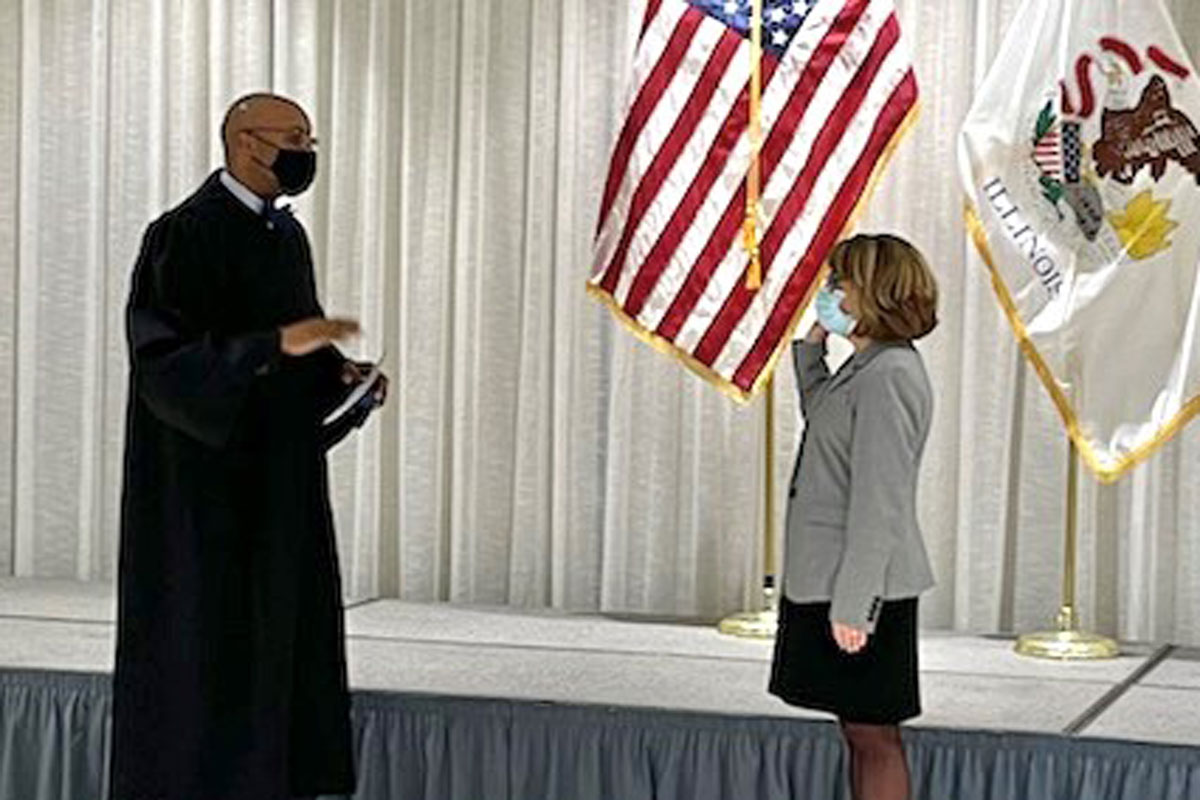- Details
- Category: Senator Don Harmon News
 Senate President Don Harmon issued the following statement following Monday’s electoral college vote:
Senate President Don Harmon issued the following statement following Monday’s electoral college vote:
“I was proud to cast my electoral ballot today for Joe Biden and Kamala Harris to become the next President and Vice President of the United States.
- Details
- Category: Senator Rachelle Crowe News
 MARYVILLE – With winter weather fast approaching, State Senators Christopher Belt (D-Centreville) and Rachelle Crowe (D-Glen Carbon) recommend bookmarking the Illinois Department of Transportation’s GettingAroundIllinois.com website for continually updated information on road conditions.
MARYVILLE – With winter weather fast approaching, State Senators Christopher Belt (D-Centreville) and Rachelle Crowe (D-Glen Carbon) recommend bookmarking the Illinois Department of Transportation’s GettingAroundIllinois.com website for continually updated information on road conditions.
“We all know how dangerous roads can become in the wintertime,” Belt said. “During snowy or icy conditions, Getting Around Illinois is a great tool for determining whether your trip out is safe.”
Read more: Belt, Crowe recommend Getting Around Illinois for updates on winter road conditions
- Details
- Category: Senator Scott Bennett News
 CHAMPAIGN – To help ensure folks stay warm during the cold winter months, State Senator Scott Bennett (D-Champaign) is collecting supplies to benefit C-U at Home.
CHAMPAIGN – To help ensure folks stay warm during the cold winter months, State Senator Scott Bennett (D-Champaign) is collecting supplies to benefit C-U at Home.
“The ongoing public health crisis has left families and neighbors in need of basic items this year,” Bennett said. “I’m confident we can come together as a community and support these people during this incredibly challenging time.”
C-U at Home is in particular need of new backpacks, hygiene supplies, long underwear and socks. These items are urgently needed to meet the needs for homeless individuals in the community.
“These folks are looking for a helping hand this year to survive the cold winter months,” Bennett said. “Donate today, if you can.”
Residents are encouraged to drop off donations to the collection box outside of Senator Bennett’s office in Champaign, located at 45 E. University, Suite 206 through Friday, Dec. 18. Bennett reminds those donating to wear a mask in the building and practice social distancing.
- Details
- Category: Senator Pat McGuire News
 The Illinois Senate Higher Education Committee is set to discuss the progress toward making the U of I’s state-of-the-art COVID-19 test, which uses saliva rather than a nasal swab, available to all of Illinois’ public universities at its meeting Monday.
The Illinois Senate Higher Education Committee is set to discuss the progress toward making the U of I’s state-of-the-art COVID-19 test, which uses saliva rather than a nasal swab, available to all of Illinois’ public universities at its meeting Monday.
"The U of I proved its mettle as a world-class research institution by developing a saliva test which is helping to keep COVID-19 cases at its campuses to a minimum," said Pat McGuire, chair of the Senate Higher Education Committee. "My colleagues and I are eager to learn when the saliva test will be available at Illinois' eight other public universities so students at those schools can safely resume full-scale in-person learning."
The committee is also set to hear an update on the Discovery Partners Institute, a long-term U of I project aimed at business and economic development in partnership with the university.
"The U of I's planned Discovery Partners Institute--billed as 'the Silicon Valley of the Midwest'--now has nearly $1 billion in state and private money behind it,” McGuire said. “It may well lead to groundbreaking scientific discoveries. But will it lead to jobs for average Illinoisans? We're eager to find out."
WHAT: Illinois Senate Higher Education Committee hearing on U of I’s rapid COVID saliva test
WHO: Members of the Senate Higher Education Committee, representatives of the University of Illinois
WHEN: Monday, Dec. 14, 1 p.m.
WHERE: The committee will meet virtually. Proceedings will be streamed live at https://ilga.gov/senateaudvid.asp. The link will become active at 1 p.m.
- Details
- Category: Senator Meg Loughran Cappel News
 PLAINFIELD – State Senator Meg Loughran Cappel (D- Shorewood) is encouraging businesses to apply for Business Interruption Grants before the Tuesday, Dec. 15 deadline.
PLAINFIELD – State Senator Meg Loughran Cappel (D- Shorewood) is encouraging businesses to apply for Business Interruption Grants before the Tuesday, Dec. 15 deadline.
“COVID-19 has hurt our local businesses and left many unsure of their future,” Loughran Cappel said. “The BIG program is helping relieve some of that stress on businesses by assisting with costs like retaining employees and keeping the lights on.”
The Department of Commerce and Economic Opportunity is providing $220 million in funding for small businesses through the BIG Program and has already begun to issue awards for the second round of grants. Businesses can use funding from these grants to cover expenses like payroll costs, rent, utilities and other operating costs.
“Our local businesses need support now more than ever, and the BIG Program is here to provide at least some relief,” Loughran Cappel said. “I urge businesses in our community to apply before the upcoming deadline of Dec. 15.”
More information on the BIG Program and the application to apply can be found on the DCEO website.
- Details
- Category: Senator Patrick Joyce News
 PARK FOREST – With winter weather approaching, State Senator Patrick Joyce (D-Essex) echoes the Illinois Department of Transportation, the Illinois State Police and the Illinois Tollway in reminding drivers to prepare for winter driving conditions.
PARK FOREST – With winter weather approaching, State Senator Patrick Joyce (D-Essex) echoes the Illinois Department of Transportation, the Illinois State Police and the Illinois Tollway in reminding drivers to prepare for winter driving conditions.
“As we head into the winter, I am asking drivers to start thinking about safe winter driving,” Joyce said. “The preparations and plans you make today can keep you and other drivers safe in the months ahead.”
Drivers should be mindful of winter driving skills and build extra time into their schedules during the winter months. As part of the “Winter Weather – Get it Together” campaign, travelers are encouraged to follow these simple guidelines:
- Bookmark com to check travel conditions 24/7.
- Wear a seat belt. It’s the law in Illinois and your best defense if you are involved in a crash.
- Drop it and drive. Put down the devices – it, too, is the law.
- Do not travel during bad weather unless absolutely necessary. If you must drive, check the weather forecast and make sure someone is aware of your route. Familiarize yourself with public transportation options.
- Slow down. Slower speeds, slower acceleration, slower steering and slower braking are required throughout the winter.
- Don’t crowd the plow. A snowplow operator’s field of vision is restricted. Even if you see them, they may not see you. Any plow that’s hit must be pulled out of service, resulting in one less resource available to clear the roads.
- Watch out for black ice. A road may appear clear but can be treacherous.
- Be especially careful when approaching intersections, ramps, bridges and shaded areas. All are prone to icing.
- Prepare an emergency kit that contains jumper cables, flares or reflectors, windshield washer fluid, a small ice scraper, traction material, blankets, non-perishable food and a first aid kit.
- Carry a cell phone and a car charger in case of emergency. For emergency assistance in the Chicago area, call *999.
- Give first responders and stranded drivers plenty of space. Obey the Move Over Law by slowing down and changing lanes when approaching any stopped vehicle with flashing lights.
- For more winter driving tips, check out this short IDOT video.
For more information on preparing for winter weather, visit IDOT.Illinois.gov.
- Details
- Category: Senator Meg Loughran Cappel News
 PLAINFIELD – State Senator Meg Loughran Cappel (D- Shorewood) is encouraging businesses to apply for Business Interruption Grants before the Tuesday, Dec. 15 deadline.
PLAINFIELD – State Senator Meg Loughran Cappel (D- Shorewood) is encouraging businesses to apply for Business Interruption Grants before the Tuesday, Dec. 15 deadline.
“COVID-19 has hurt our local businesses and left many unsure of their future,” Loughran Cappel said. “The BIG program is helping relieve some of that stress on businesses by assisting with costs like retaining employees and keeping the lights on.”
The Department of Commerce and Economic Opportunity is providing $220 million in funding for small businesses through the BIG Program and has already begun to issue awards for the second round of grants. Businesses can use funding from these grants to cover expenses like payroll costs, rent, utilities and other operating costs.
“Our local businesses need support now more than ever, and the BIG Program is here to provide at least some relief,” Loughran Cappel said. “I urge businesses in our community to apply before the upcoming deadline of Dec. 15.”
More information on the BIG Program and the application to apply can be found on the DCEO website.
- Details
- Category: Senator Meg Loughran Cappel News
 SHOREWOOD— Joliet native Meg Loughran Cappel was sworn in to represent the 49th State Senate District on Thursday.
SHOREWOOD— Joliet native Meg Loughran Cappel was sworn in to represent the 49th State Senate District on Thursday.
Loughran Cappel is ready to advocate for Will and Kendall County families in Springfield.
“It is an honor to represent the hardworking families of our district in Springfield,” Loughran Cappel said. “We have important decisions to make this upcoming legislative session and I am ready to fight to protect our local businesses, ensure our children and educators have the resources to be successful and for common sense measures that will grow our region’s economy.”
More Articles …
- Harris advocates for diversity in Illinois pension funds
- Manar leads joint committee hearing to report on the progress of the Illinois Commission on Equitable Early Childhood Education & Care Funding
- Bennett urges local groups to apply for second round of broadband expansion grants
- Morrison: Register to find out when the COVID-19 vaccine is available
Page 587 of 768













 © 2026 Illinois Senate Democratic Caucus
© 2026 Illinois Senate Democratic Caucus